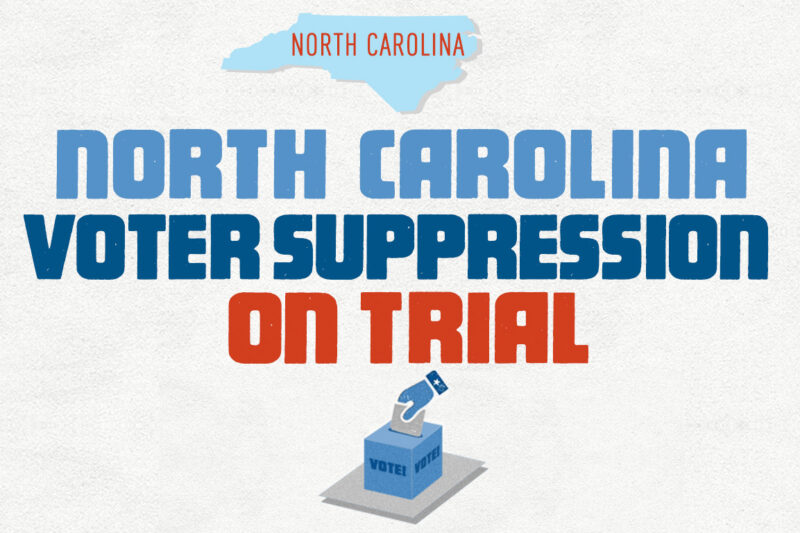
Tomorrow we will present closing arguments in our three-week trial challenging North Carolina’s repressive voting laws. Over the past weeks, we heard about the hurdles that voters faced to cast their vote under the suppressive law North Carolina instituted almost two years ago. North Carolina did away with the week of early voting in which 900,000 voters voted last presidential election, eliminated the opportunity to register and vote on the same day, and prohibited the failsafe of out-of-precinct voting. All three provisions placed a heavier burden on African-American voters than white voters, because African-American voters disproportionately used the eliminated voting methods.

We heard from Michael Owens, who testified that he could not reach his assigned polling place on Election Day without a car, but was able to get to a polling place near work. Because North Carolina eliminated out-of-precinct voting, he was turned away at the polls without having the opportunity to cast his ballot. In a state where there are deep disparities by race in car ownership, a history of segregated neighborhoods, and inadequate public transportation, the fact that Owens is one of many Black voters who is affected by this change should come as no surprise.
We heard from Jessica Jackson, a long-time voter who tried to register at the DMV after moving across county lines, only to find out at the polls on Election Day that the DMV had failed to transmit her voter registration. In previous elections, she would have been able to easily correct the DMV’s error using same-day registration. Under the new repressive regime, her vote did not count. The state’s error disenfranchised her completely.
We heard from industrial engineer Ted Allen, an expert in waiting-line analysis, who testified that the 900,000 voters who may shift from the eliminated days of early voting to Election Day will lead to long lines at the polls, a la Florida in 2012. More than 70 percent of African-American voters utilized early voting during the 2008 and 2012 general elections and will no longer have that opportunity. And the long lines that form on Election Day will affect all voters.
In recent years, after a decade of slowly making access to voting more equitable, African-American North Carolinians started to reach parity in political participation. In spite of that history ‚ÄĒ or perhaps, because of it ‚ÄĒNorth Carolina legislators surgically extracted from the election laws the very provisions that African-American voters most heavily relied upon.
Just as we are making progress addressing North Carolina’s stark history of racial discrimination in voting, the state took a huge step backwards. The state cannot simply shrug its shoulders when, predictably, discrimination continues to seep into present-day elections. Thankfully, the Voting Rights Act is still here to protect against this discrimination.



